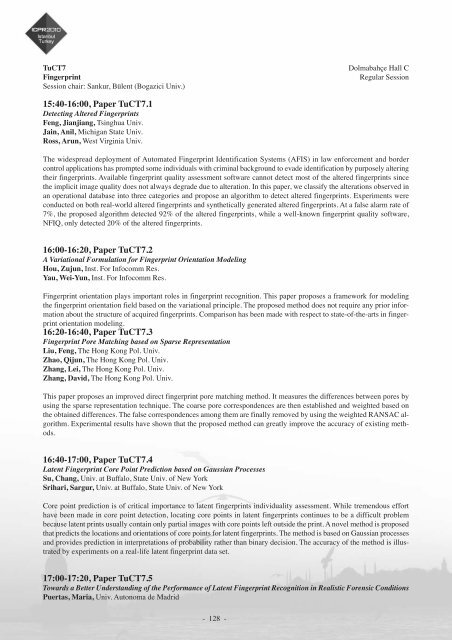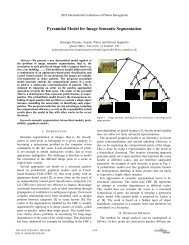Abstract book (pdf) - ICPR 2010
Abstract book (pdf) - ICPR 2010
Abstract book (pdf) - ICPR 2010
- TAGS
- abstract
- icpr
- icpr2010.org
You also want an ePaper? Increase the reach of your titles
YUMPU automatically turns print PDFs into web optimized ePapers that Google loves.
TuCT7 Dolmabahçe Hall C<br />
Fingerprint Regular Session<br />
Session chair: Sankur, Bülent (Bogazici Univ.)<br />
15:40-16:00, Paper TuCT7.1<br />
Detecting Altered Fingerprints<br />
Feng, Jianjiang, Tsinghua Univ.<br />
Jain, Anil, Michigan State Univ.<br />
Ross, Arun, West Virginia Univ.<br />
The widespread deployment of Automated Fingerprint Identification Systems (AFIS) in law enforcement and border<br />
control applications has prompted some individuals with criminal background to evade identification by purposely altering<br />
their fingerprints. Available fingerprint quality assessment software cannot detect most of the altered fingerprints since<br />
the implicit image quality does not always degrade due to alteration. In this paper, we classify the alterations observed in<br />
an operational database into three categories and propose an algorithm to detect altered fingerprints. Experiments were<br />
conducted on both real-world altered fingerprints and synthetically generated altered fingerprints. At a false alarm rate of<br />
7%, the proposed algorithm detected 92% of the altered fingerprints, while a well-known fingerprint quality software,<br />
NFIQ, only detected 20% of the altered fingerprints.<br />
16:00-16:20, Paper TuCT7.2<br />
A Variational Formulation for Fingerprint Orientation Modeling<br />
Hou, Zujun, Inst. For Infocomm Res.<br />
Yau, Wei-Yun, Inst. For Infocomm Res.<br />
Fingerprint orientation plays important roles in fingerprint recognition. This paper proposes a framework for modeling<br />
the fingerprint orientation field based on the variational principle. The proposed method does not require any prior information<br />
about the structure of acquired fingerprints. Comparison has been made with respect to state-of-the-arts in fingerprint<br />
orientation modeling.<br />
16:20-16:40, Paper TuCT7.3<br />
Fingerprint Pore Matching based on Sparse Representation<br />
Liu, Feng, The Hong Kong Pol. Univ.<br />
Zhao, Qijun, The Hong Kong Pol. Univ.<br />
Zhang, Lei, The Hong Kong Pol. Univ.<br />
Zhang, David, The Hong Kong Pol. Univ.<br />
This paper proposes an improved direct fingerprint pore matching method. It measures the differences between pores by<br />
using the sparse representation technique. The coarse pore correspondences are then established and weighted based on<br />
the obtained differences. The false correspondences among them are finally removed by using the weighted RANSAC algorithm.<br />
Experimental results have shown that the proposed method can greatly improve the accuracy of existing methods.<br />
16:40-17:00, Paper TuCT7.4<br />
Latent Fingerprint Core Point Prediction based on Gaussian Processes<br />
Su, Chang, Univ. at Buffalo, State Univ. of New York<br />
Srihari, Sargur, Univ. at Buffalo, State Univ. of New York<br />
Core point prediction is of critical importance to latent fingerprints individuality assessment. While tremendous effort<br />
have been made in core point detection, locating core points in latent fingerprints continues to be a difficult problem<br />
because latent prints usually contain only partial images with core points left outside the print. A novel method is proposed<br />
that predicts the locations and orientations of core points for latent fingerprints. The method is based on Gaussian processes<br />
and provides prediction in interpretations of probability rather than binary decision. The accuracy of the method is illustrated<br />
by experiments on a real-life latent fingerprint data set.<br />
17:00-17:20, Paper TuCT7.5<br />
Towards a Better Understanding of the Performance of Latent Fingerprint Recognition in Realistic Forensic Conditions<br />
Puertas, Maria, Univ. Autonoma de Madrid<br />
- 128 -



